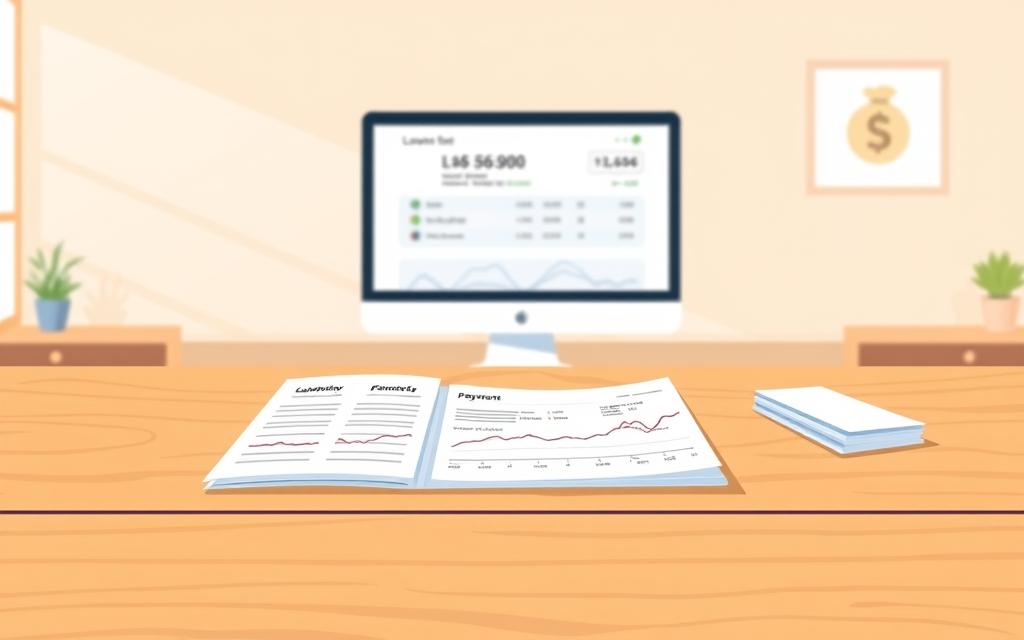Advertisement
Nearly 1 in 5 Americans have some form of debt. Many struggle to make timely payments. Missing a loan payment can be stressful. But knowing the consequences can help you get back on track.
Missing a payment can lead to late fees and damage to your credit score. The effects of a missed loan payment can be severe. It might even lead to loan default. We’ll look at the immediate effects and offer advice on managing the situation.
It’s important to understand how it affects your financial health. Knowing what to expect helps you take steps to lessen the impact. This way, you can recover from a missed payment.
Understanding Loan Payments
Loan payments are key to keeping your finances in check. When you borrow money, you promise to pay it back, usually every month. This includes the amount you borrowed and extra interest.
Timely payments are essential to avoid late fees and negative impacts on your credit score. A good payment history is a significant factor in determining your creditworthiness.

What is a Loan Payment?
A loan payment is a regular installment paid towards a loan, typically on a monthly basis. It consists of two main components: the principal amount and the interest charged. The principal amount goes towards repaying the borrowed sum, while the interest is the cost of borrowing.
As stated by financial expert,
“Making on-time loan payments is crucial for maintaining a good credit score and avoiding financial penalties.”
Understanding the structure of your loan payments can help you manage your finances more effectively.
The Importance of Timely Payments
Making timely loan payments is critical for several reasons. Firstly, it helps you avoid financial penalties such as late fees and interest rate increases. Secondly, a good payment history contributes positively to your credit score, making it easier to secure loans or credit in the future.
- Timely payments help avoid late fees and penalties.
- A good payment history enhances your credit score.
- Consistent payments demonstrate financial responsibility.
By prioritizing your loan payments, you can maintain a healthy financial profile and avoid the consequences of missed payments. It’s essential to understand the terms of your loan and plan your finances to ensure timely payments.
Immediate Consequences of Missing a Payment
Missing a loan payment can lead to many financial problems. It’s not just a one-time penalty. It can start a chain reaction that harms your financial health in many ways.
Late Fees: What to Expect
One of the first things you’ll face is late fees. These fees depend on the lender and the loan type. For example, credit card companies might charge up to $30 for a missed payment.
Let’s look at how late fees can add up:
| Missed Payment Amount | Late Fee | Total Due |
|---|---|---|
| $100 | $25 | $125 |
| $500 | $30 | $530 |
Interest Rate Increases
Missing a payment can also raise your interest rate. Some lenders increase your rate if you miss a payment. This makes it harder to pay back what you owe.
Impact on Repayment Timeline
Late fees and higher interest rates can change your repayment timeline. As you owe more, it takes longer to pay off the loan. This can extend your repayment period by months or years.
For example, a 5-year loan can become 6 years or more if you miss a payment. This depends on the penalties you face.
Effects on Your Credit Score
Missing a loan payment can really hurt your credit score. Your credit score shows how reliable you are with money. Lenders look at it to decide if they should lend to you.
When you miss a payment, your credit score might go down. This makes it harder to get credit later. How much it drops depends on your past payments, how much credit you use, and the type of credit.
How Missed Payments Affect Your Score
Missed payments can lower your score a lot. The credit scoring models focus a lot on your payment history. A missed payment can lower your score by 100 points or more, depending on your score.
For example, if your score is 750, a missed payment could drop it to 650 or lower. This makes it harder to get loans or credit cards with good interest rates.
The Long-Term Impact on Creditworthiness
A missed payment can hurt your creditworthiness for a long time. A low credit score means you might not get credit easily. You might also pay more interest or get worse loan terms.
| Credit Score Range | Impact of Missed Payment | Potential Interest Rate |
|---|---|---|
| 750-850 | Minor impact, potentially 1-50 point drop | Lower interest rates (e.g., 3.5%) |
| 650-749 | Moderate impact, potentially 50-100 point drop | Moderate interest rates (e.g., 5%) |
| Below 650 | Significant impact, potentially 100+ point drop | Higher interest rates (e.g., 8% or more) |
Knowing how missed payments affect your score can help. Keep up with payments and check your credit report. This way, you can improve your creditworthiness over time.
Communication with Lenders
Lenders often help borrowers who are struggling to make payments. It’s a good idea to talk to them. By discussing your situation, you might find a solution that works for both of you.
Why You Should Contact Your Lender
Reaching out to your lender can prevent worse problems. They usually prefer to find a way to help you rather than start debt collection. Talking to them might lead to temporary payment breaks or lower payments.
Lenders can also guide you on managing your debt. They can explain your options and the effects of each. This can help you stay on top of your finances and avoid loan default.
Examples of Loan Modification Options
Loan modifications vary based on the lender and loan type. Some common options include:
- Temporary reduction or suspension of payments
- Extension of the loan term to reduce monthly payments
- Adjustment of the interest rate to make payments more manageable
These can be big helps for those in financial trouble. It’s key to talk to your lender about your specific situation to find the best solution.
Options for Handling Missed Payments
Missing a loan payment can lead to financial penalties. It’s important to know your options to avoid these penalties. Understanding your choices can help you manage your loan payments better.
Grace Periods: What They Are
A grace period lets you make a late payment without extra fees or credit damage. Lenders offer grace periods to help borrowers. They allow you to pay a few days late without penalty.
Grace periods vary by lender. Some automatically apply them, while others need a request. Always check your loan agreement or talk to your lender about their policy.
Payment Plans and Restructuring
Struggling with loan payments? A payment plan or loan restructuring might help. A payment plan lets you temporarily reduce or stop payments. This gives you time to recover financially.
Loan restructuring changes your loan terms. It could extend your repayment period or lower your interest rate. This makes monthly payments easier to handle, helping with long-term financial issues.
| Option | Description | Benefits |
|---|---|---|
| Grace Period | A period allowing late payment without penalty | Avoids late fees and negative credit reporting |
| Payment Plan | Temporary reduction or suspension of payments | Provides temporary financial relief |
| Loan Restructuring | Modification of loan terms for easier repayment | Makes monthly payments more manageable |
Keeping a good payment history is key to your financial health. Using these options can prevent financial penalties and keep you on track with your loan payments.
Reporting to Credit Bureaus
Missing a loan payment can lead to your lender sharing this with credit bureaus. This can harm your credit report for a long time.
When Do Lenders Report Missed Payments?
Lenders report missed payments after 30 days of being late. But, this time can change based on the lender and the loan type. Knowing this can help you avoid big credit score drops.
The Fair Credit Reporting Act (FCRA) controls how lenders report to credit bureaus. It makes sure the info is correct and fair. Keeping up with payments is key to a good credit score.
Impact of Late Payments on Credit Reports
Late payments can really hurt your credit score. A missed payment can make it harder to get loans or credit later. Here’s why:
- A late payment can stay on your report for up to seven years.
- Recent late payments hurt more than older ones.
- Many late payments can make things worse.
To lessen the damage, act fast. Talk to your lender and make payment plans. Knowing how this works can help you protect your credit score.
Understanding Defaulting on a Loan
It’s important to know what defaulting on a loan means. Defaulting happens when you can’t pay back a loan as agreed. This can lead to serious financial trouble.
There are many reasons why someone might default on a loan. These include losing a job, unexpected bills, or financial struggles. Spotting these signs early can help you avoid default.
What Constitutes Default?
Default usually starts when you miss a few payments. How many missed payments it takes to default varies. It depends on the loan and the lender’s rules.
Common signs of default include:
- Missing several loan payments
- Failing to stick to the repayment plan
- Not following the loan agreement
Consequences of Defaulting on Loans
Defaulting on a loan can cause big problems. These include extra fees, a hit to your credit score, and even legal trouble.
“Defaulting on a loan can lead to serious financial repercussions, including significant damage to your credit score and potential legal consequences.”
The main effects of defaulting on a loan are:
- Extra fees and penalties
- A drop in your credit score
- Lenders might take legal action
- They might take back any collateral you used for the loan
Knowing these risks can help you avoid default. It’s also wise to talk to your lender about possible solutions. This could be changing your payment plan or getting a temporary break from payments.
Recovery from Missed Payments
Missing a loan payment can hurt your credit score. But, acting fast can lessen the damage. It’s important to tackle the problem quickly and make a plan to avoid missing payments again.
Improving Your Credit Score Post-Miss
To boost your credit score after a missed payment, follow some key steps. First, make sure to pay on time for your next payment. Your payment history is a big part of your credit score, so it’s vital to get back on track.
Here are ways to improve your score:
- Pay all future payments on time to show you’re responsible.
- Lower your debt to improve your credit utilization ratio, which helps your score.
- Check your credit report for errors or negative marks from the missed payment.
Steps to Take After a Late Payment
If you’ve missed a payment, act quickly. First, contact your lender to talk about your situation and possible solutions to avoid more penalties.
Consider these steps:
- Review your budget to find ways to save more for your loan payments.
- Set up automatic payments to avoid missing payments in the future.
- Look into a payment plan if you’re struggling. Many lenders offer hardship programs or payment restructuring.
Recovering from a missed payment takes time and effort. By being proactive and sticking to your financial commitments, you can recover and even boost your credit score over time.
Proactive Strategies to Avoid Missed Payments
To keep your finances healthy, it’s key to use strategies that stop missed loan payments. This way, you can dodge financial penalties and keep your payment history strong.
Setting Up Automatic Payments
Setting up automatic payments is a smart move for on-time payments. It stops you from forgetting to pay, avoiding late fees and keeping your credit score up.
- Convenience: Automatic payments are easy to set up online or through apps.
- Reliability: They make sure payments are made on time, avoiding penalties.
- Flexibility: You can pick the payment date, helping with your money flow.
Creating a Budget to Manage Finances
Creating a budget is another smart way to manage your money. It helps you plan your income for different expenses, making sure you have enough for loan payments.
Steps to Create a Budget:
- Track your income and expenses to see where your money goes.
- Find ways to cut back on unnecessary spending.
- Set aside money for loan payments and other must-haves.
- Update your budget as your income or expenses change.
Using these strategies can greatly lower the chance of missed payments and penalties. This keeps your payment history healthy.
Seeking Financial Counseling
Professional financial counseling can be a big help if you’re struggling with debt or loan defaults. It’s important to manage your money well. If you’re having trouble, getting help can really make a difference.
When to Consider Professional Help
If you’re having trouble with loan payments or feeling overwhelmed by debt, it’s time to get help. Early intervention can stop things from getting worse. It might even save you from debt collection problems.
Look out for signs you need help. These include getting constant reminders about missed payments, seeing your interest rates go up, or not being able to handle your loan default situation.
Resources for Financial Assistance
There are many places where you can get financial help. Non-profit credit counseling agencies can guide you on managing your debt. They might also have programs to help you get back on track financially.
- Financial advisors can create plans to help you tackle your debt.
- Debt management programs can combine your payments and talk to creditors for you.
- Online resources and educational materials can improve your financial knowledge.
By getting financial counseling, you can better understand your financial situation. You can also make a plan to overcome your challenges. It’s a step towards a more stable financial future.
Legal Ramifications of Loan Defaults
Defaulting on a loan can lead to serious legal issues, including lawsuits. If a borrower misses payments, the lender might sue to get their money back. It’s important for borrowers to know the legal risks of default to avoid it and manage payments well.
Possibility of Legal Action
Lenders can take legal steps against borrowers who default. This might mean suing to get a court judgment. If the court sides with the lender, the borrower could face wage garnishment, asset seizure, or other measures to collect the debt.
Potential Legal Consequences:
- Lawsuits and court judgments
- Wage garnishment
- Asset seizure
- Negative impact on credit reports
Understanding Your Rights
It’s crucial for borrowers to know their rights when facing loan defaults and legal actions. You have the right to know about debt collection and to dispute the debt if needed. You can also get help from a financial counselor or attorney.
Key Rights:
- Right to be informed about debt collection
- Right to dispute the debt
- Right to seek professional assistance
| Legal Action | Description | Potential Consequences |
|---|---|---|
| Lawsuit | Lender files a lawsuit to obtain a court judgment for the debt. | Court judgment, wage garnishment, asset seizure |
| Wage Garnishment | Court orders employer to withhold a portion of borrower’s wages to pay the debt. | Reduced take-home pay, financial hardship |
| Asset Seizure | Lender seizes borrower’s assets to satisfy the debt. | Loss of assets, financial instability |
Knowing the legal effects of loan defaults and your rights can help you deal with these tough situations better. It’s key to talk to your lender and get professional advice when needed to avoid or lessen the effects of loan default.
Conclusion and Next Steps
Missing a loan payment can have big consequences. It can hurt your credit score and lead to long-term financial problems. It’s important to understand these effects to manage your money well.
Key Takeaways
Missing a payment can lead to immediate issues like late fees and higher interest rates. It also affects your creditworthiness over time. To avoid these problems, set up automatic payments and make a budget.
Effective Loan Management
To keep your finances healthy, know your loan terms well. If you’re struggling, talk to your lender. Look into loan modifications or restructuring. These steps can help prevent missed payments and protect your credit score and financial stability.



